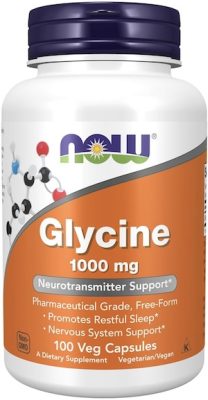Introduction
Glycine is a fundamental amino acid that plays a surprisingly powerful role in your overall health. Often overlooked, emerging research highlights its significant benefits for reducing inflammation, supporting joint repair, and even improving sleep quality.
This guide will explore everything you need to know about glycine. We’ll cover what it is, its evidence-backed health benefits, and how you can easily increase your intake through diet and supplements to support your well-being.
What Is Glycine?
Glycine is the simplest of the 20 amino acids that function as the “building blocks of life.” It is classified as a non-essential amino acid, which means your body can produce it on its own. However, the amount your body synthesizes may not be optimal, especially during times of stress, illness, or aging.
Glycine is crucial for several vital bodily processes:
- Collagen Production: It is the most abundant amino acid in collagen, the protein that provides structure to skin, bones, cartilage, and connective tissues.
- Glutathione Synthesis: Glycine is a key component of glutathione, the body’s master antioxidant.
- Neurotransmitter Function: It acts as a calming neurotransmitter in the brain, helping regulate nerve signals.
Top 7 Health Benefits of Glycine
1. Fights Chronic Inflammation
While short-term inflammation is a healthy response to injury, chronic inflammation is linked to conditions like heart disease, diabetes, and arthritis. Glycine helps combat this by:
- Reducing Inflammatory Cytokines: It helps calm overactive immune cells, lowering their production of inflammatory signaling molecules called cytokines.
- Boosting Antioxidant Levels: By aiding in the creation of glutathione, glycine helps your body neutralize free radicals and reduce oxidative stress, a major driver of inflammation.
2. Supports Joint and Bone Health
Because glycine makes up roughly one-third of collagen, it is essential for maintaining healthy joints.
- Aids Cartilage Repair: Adequate glycine levels support the body’s ability to repair and maintain cartilage, which can help reduce joint pain and stiffness.
- May Alleviate Arthritis Symptoms: Studies suggest glycine’s anti-inflammatory properties may help reduce symptoms associated with both osteoarthritis and rheumatoid arthritis.
3. Improves Sleep Quality
If you struggle with falling or staying asleep, glycine could be a natural solution. Research shows that taking glycine before bed can:
- Lower Core Body Temperature: Glycine has a calming effect on the brain and helps slightly lower your body’s core temperature, which signals to your body that it’s time to sleep.
- Improve Sleep Onset and Efficiency: Studies indicate it can help you fall asleep faster, reach deep sleep more quickly, and reduce daytime fatigue.
4. Enhances Brain Function
As a neurotransmitter, glycine plays a role in cognitive health. It has been shown to potentially:
- Improve memory and attention.
- Regulate mood and reduce symptoms of anxiety.
5. Promotes Metabolic Health
Glycine has been shown to improve insulin sensitivity, which is the body’s ability to use glucose effectively. This makes it beneficial for regulating blood sugar levels and may reduce the risk of type 2 diabetes.
6. Protects Heart Health
By reducing inflammation and oxidative stress—two key risk factors for cardiovascular disease—glycine may help protect the heart. Some research suggests it can help prevent the hardening of arteries.
7. Supports a Healthy Gut
Glycine helps maintain the integrity of the gut lining. This can help prevent or repair “leaky gut syndrome,” a condition where toxins can pass from the intestine into the bloodstream, causing widespread inflammation.
How to Get More Glycine
You can increase your glycine levels through both food and supplements.
Natural Food Sources
- Bone Broth: The richest natural source, as it is full of gelatin derived from collagen.
- Gelatin: Found in jellies, desserts, and gummy candies.
- Collagen-Rich Meats: Skin-on chicken, pork, and tougher cuts of meat like brisket and oxtail.
- Fish and Seafood
- Eggs and Dairy Products
Glycine Supplements

For a more targeted and concentrated dose, glycine supplements are a convenient option. They are widely available in powder or capsule form.
- Recommended Dosage: Most studies use daily doses between 3–10 grams to achieve health benefits. It is best to start with a lower dose and see how your body responds.
- Safety and Side Effects: Glycine is generally considered safe with a low risk of side effects. Some individuals may experience mild stomach upset at higher doses. Always consult with your healthcare provider before starting any new supplement, especially if you are pregnant, breastfeeding, or taking other medications.
Conclusion: A Simple Step for Better Health
Glycine is a vital amino acid that offers a wide range of benefits, from reducing systemic inflammation and easing joint pain to promoting restful sleep and protecting your gut. By incorporating glycine-rich foods like bone broth or considering a high-quality supplement, you can take a proactive step toward supporting your long-term health and well-being.
Frequently Asked Questions (FAQ)
Q: What is glycine best for? A: Glycine is most known for its powerful anti-inflammatory properties, its role in building collagen for joint and skin health, and its ability to improve sleep quality.
Q: How long does it take for glycine to work? A: Effects on sleep can often be noticed within the first few nights. Benefits for inflammation and joint health may take several weeks or months of consistent intake to become apparent.
Q: Can I take glycine every day? A: Yes, glycine is generally considered safe for daily use within recommended dosages. Many studies on its benefits involve daily supplementation over extended periods.
Q: What are the signs of glycine deficiency? A: While a true deficiency is rare since the body produces it, suboptimal levels can contribute to poor joint health, slow wound healing, fatigue, and trouble sleeping.
Medical Disclaimer: The information in this article is for educational purposes only and is not intended as medical advice. Please consult with a qualified healthcare professional before making any decisions about your health or treatment.


